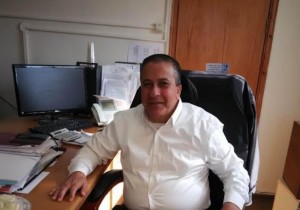T. Belman. This support should be tied to the percentage of municipal taxes the city collects.
Badir explains that city, with 22,000 residents, only received municipality property taxes from around 50% of them; today, that number is at 83%.
 The Mayor of the Israeli Arab city of Kfar Kassem told The Jerusalem Post on Thursday that his city is developing rapidly and could become a model for other Arab cities to follow.
The Mayor of the Israeli Arab city of Kfar Kassem told The Jerusalem Post on Thursday that his city is developing rapidly and could become a model for other Arab cities to follow.
In an interview in the office of Adel Badir, who has served two years since his first election, he explained with maps and an able Jewish spokesman, how he is transforming the city in a way that perhaps no other Arab locality has until now.
Three years ago, Badir explained that the city, with 22,000 residents, only received municipality property taxes (arnona) from around 50 percent of them. Today, that number is at 83%, which he says is reaching the level of Jewish municipalities and something rare for Arab ones.
He did it by calling up families on the phone himself urging people to pay up. The fact that three new parks and other development projects are underway helped gain support of residents that saw that the money was going to good use.
But the municipality needs more money to fund its ambitious growth plans, which also includes a goal of paving all of the roads, boosting education, and other services. Currently, almost half of the roads are unpaved with pot holes are scattered across many of the city’s streets.
One way the city seeks to boost its tax revenue is by getting a share of such revenue generated by the Afek industrial park located adjacent to the city, but which technically belongs to the nearby Jewish city of Rosh Ha’ayin.
Badir argues that since the park is geographically closer to his city and in fact creates high levels of traffic congestion at the entrance of his city, it is only fair that his city should get some of the tax revenues which his office estimates is around 45 million NIS per year.
Discussions were held with the Rosh Ha’ayin municipality, which rejected any idea of sharing revenue. Badir then took up the matter with the interior ministry, where it is currently stalled in what appears to be a drawn out bureaucratic process. If things go nowhere, eventually the city would go to court, said the mayor.
He insists that a precedence exists for making such changes and that one of the reasons something has not been worked out in this case is because it has become a “national” issue with an Arab city demanding revenue from a Jewish one. If it the demand was against a bordering Arab village, Badir argues it would have already been approved.
Badir points out that while his city spends around 4,400 NIS per resident, Rosh Ha’ayin spends 6,400.
Another land issue that hampers the ability of the city to gain tax revenue is in its own Lev-Ha’aretz industrial zone, which is limited in status, which prevents it from developing it further and building high-rise office buildings such as exist in the nearby Afek industrial zone. Government obstacles have also impeded this plan.
A new high-tech college is going to be inaugurated next month with the cooperation of NGO Tsofen, top US University MIT and the government. For now the college is going to rent space, but eventually they will have their own building. It will also house hi-tech companies in order to provide work for graduates of the training program.
Another initiative which is new for an Arab city is a womens’ council which advises him on issues that they care about. Such councils already exists in some Jewish municipalities.
Asked about violence and relations with Jews, the mayor claims that approximately 80% of the businesses in the city are Jewish owned. Violence has dropped by around 30% since Badir took over and he now seeks to build a camera security network throughout the city, but currently lacks funds.
Questioned if the rival families in the city create internal divisions and difficulties in governing the city, he responded that in fact, there is no opposition since everyone joined the governing coalition on the city council.
Asked about the issue of the ban on of the northern branch of the Islamic Movement and if it has affected the city, Badir responded that since the city is a stronghold of the southern branch of the Islamic Movement, there is no northern branch presence there.
He added that he himself is part of the southern branch of the movement.
A concluding point made by Badir in the meeting, was that if the city could generate more of its own revenue, it would become the first Arab city to become fully independent, not needing extra government aid. Therefore, he sees it as in the interest of the government to help Kfar Kassem flourish.



Leave a Reply
You must be logged in to post a comment.